Intro
The human mouth is a complex and fascinating system, comprising numerous components that work together to facilitate functions such as eating, speaking, and overall oral health. Among the various teeth that make up the dental structure, there is a specific set known as wisdom teeth. These teeth have garnered significant attention and discussion, particularly in relation to their development, purpose, and the potential issues they can cause. Understanding what wisdom teeth are, their role, and the implications of their presence is essential for maintaining good oral health.
Wisdom teeth, also known as third molars, are the last set of teeth to erupt in the human mouth, typically appearing between the ages of 17 and 25. The term "wisdom" is believed to have originated from the fact that these teeth emerge at a more mature age, when individuals are supposedly wiser. The primary function of wisdom teeth is to provide additional chewing surface, aiding in the breakdown and digestion of food. However, the need for wisdom teeth in modern humans is a topic of debate among dental professionals and anthropologists, given the changes in human diet and jaw structure over time.
The development and eruption of wisdom teeth can vary significantly among individuals. While some people may experience no issues with their wisdom teeth, others may encounter problems such as impaction, where the tooth does not have enough space to come in properly, or overcrowding, which can lead to discomfort, pain, and potentially more serious oral health issues. The variability in the experience of wisdom teeth highlights the importance of regular dental check-ups and monitoring the development of these teeth to prevent or address any complications early on.
Understanding Wisdom Teeth Development
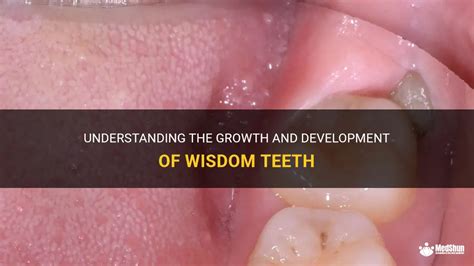
The development of wisdom teeth begins many years before they actually emerge into the mouth. The process starts with the formation of the tooth bud, which eventually develops into a fully formed tooth. This development is influenced by a combination of genetic and environmental factors, which can affect the size, shape, and positioning of the wisdom teeth. Understanding the developmental process of wisdom teeth is crucial for predicting potential issues and planning appropriate interventions.
Factors Influencing Wisdom Teeth Development
Several factors can influence the development and eruption of wisdom teeth, including genetics, diet, and overall oral health. For instance, individuals with a family history of wisdom teeth problems may be more likely to experience similar issues. Additionally, a diet high in processed foods and low in fiber may contribute to a narrower jaw and increased risk of wisdom teeth impaction. Regular dental care and a balanced diet can help mitigate some of these factors and support healthy development.The Role of Wisdom Teeth in Oral Health
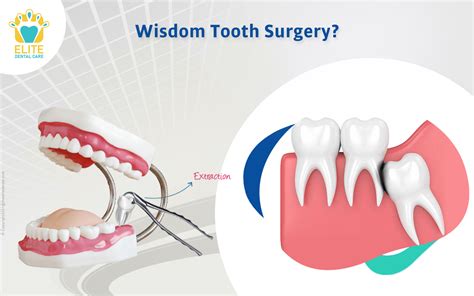
Wisdom teeth play a role in the overall structure and function of the mouth, particularly in terms of chewing and digestion. When properly aligned and healthy, wisdom teeth can enhance the chewing surface, distributing the force of chewing more evenly across the teeth. This can potentially reduce wear on other teeth and contribute to more efficient food breakdown. However, the actual necessity of wisdom teeth in modern humans is debated, considering the evolution of the human diet and changes in jaw size and structure.
Benefits and Drawbacks of Wisdom Teeth
The presence of wisdom teeth can have both benefits and drawbacks. On the one hand, they can provide additional chewing surface and support the overall structure of the jaw. On the other hand, they can also lead to issues such as overcrowding, impaction, and increased risk of oral infections. The decision to keep or remove wisdom teeth depends on various factors, including the individual's oral health, the position and health of the wisdom teeth, and the potential for current or future problems.Common Issues Associated with Wisdom Teeth
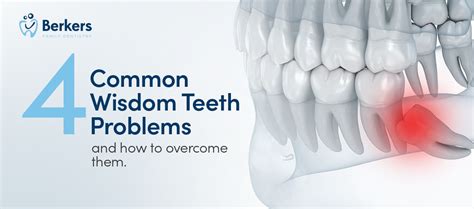
Several common issues are associated with wisdom teeth, including impaction, where the tooth does not have enough room to come in properly, and overcrowding, which can cause the wisdom teeth to push against other teeth. Additionally, wisdom teeth can be more prone to decay and gum disease due to their location, which can make them harder to clean. These issues highlight the importance of regular dental check-ups to monitor the development and health of wisdom teeth.
Symptoms and Diagnosis of Wisdom Teeth Issues
Symptoms of wisdom teeth issues can include pain, swelling, and discomfort in the area around the wisdom teeth, as well as bad taste or bad breath. Diagnosis typically involves a dental examination, including X-rays to assess the position and health of the wisdom teeth. Early diagnosis is key to preventing more serious complications and determining the best course of action, whether that involves monitoring, removal, or other treatments.Treatment Options for Wisdom Teeth Issues
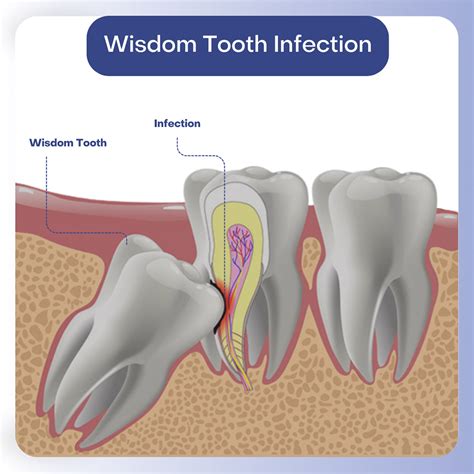
Treatment for wisdom teeth issues depends on the specific problem and can range from regular monitoring to surgical removal. In cases of impaction or overcrowding, removal of the wisdom teeth may be necessary to prevent or alleviate symptoms. The decision to remove wisdom teeth should be made in consultation with a dental professional, considering factors such as the individual's overall health, the likelihood of future problems, and the potential impact on oral health and function.
Post-Removal Care and Recovery
After the removal of wisdom teeth, it's essential to follow a careful recovery plan to ensure proper healing and minimize the risk of complications. This includes following dietary restrictions, managing pain, and maintaining good oral hygiene. The recovery period can vary depending on the individual and the specifics of the procedure, but most people can return to their normal activities within a few days.Preventive Measures for Wisdom Teeth Issues
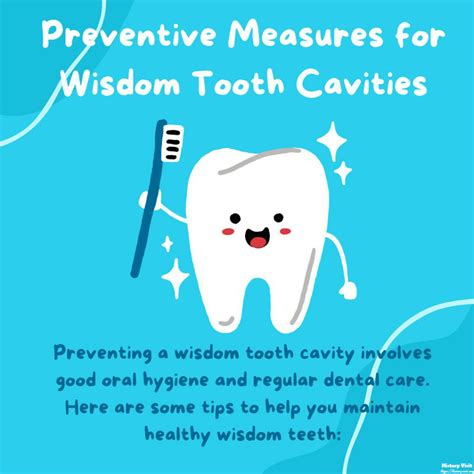
Preventing wisdom teeth issues involves a combination of regular dental check-ups, good oral hygiene practices, and a healthy diet. Early identification of potential problems allows for timely intervention, which can prevent more serious issues from developing. Additionally, practices such as flossing and using an antibacterial mouthwash can help reduce the risk of gum disease and other oral health problems associated with wisdom teeth.
Importance of Regular Dental Check-Ups
Regular dental check-ups are crucial for monitoring the development and health of wisdom teeth, as well as overall oral health. These visits provide an opportunity for early detection of potential issues, allowing for preventive measures or interventions to be taken before problems become more serious. A proactive approach to dental care can significantly reduce the risk of complications related to wisdom teeth and contribute to a lifetime of good oral health.Conclusion and Future Directions
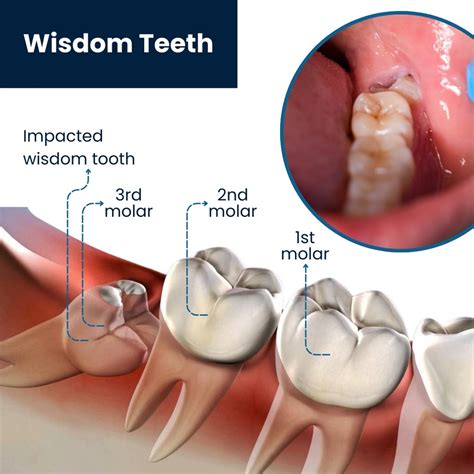
In conclusion, wisdom teeth are a natural part of human dental development, but their presence can be associated with various issues. Understanding the development, role, and potential problems of wisdom teeth is essential for maintaining good oral health. As dental care and technology continue to evolve, future directions may include more precise diagnostic tools, less invasive treatment options, and personalized approaches to wisdom teeth management. By staying informed and proactive about oral health, individuals can navigate the complexities of wisdom teeth with confidence.
What are wisdom teeth and why are they important?
+Wisdom teeth, or third molars, are the last set of teeth to erupt in the human mouth, typically appearing between the ages of 17 and 25. They are important as they provide additional chewing surface, aiding in the breakdown and digestion of food.
What are common issues associated with wisdom teeth?
+Common issues include impaction, where the tooth does not have enough space to come in properly, and overcrowding, which can cause discomfort, pain, and potentially more serious oral health issues.
How can I prevent wisdom teeth issues?
+Prevention involves regular dental check-ups, good oral hygiene practices such as flossing and using an antibacterial mouthwash, and a healthy diet. Early identification of potential problems allows for timely intervention.
We hope this comprehensive guide to wisdom teeth has been informative and helpful. Whether you're looking to understand more about your own wisdom teeth or seeking advice on how to manage potential issues, it's essential to consult with a dental professional. Share your thoughts or questions about wisdom teeth in the comments below, and consider sharing this article with others who might find it useful. Together, we can promote better oral health and well-being for everyone.
